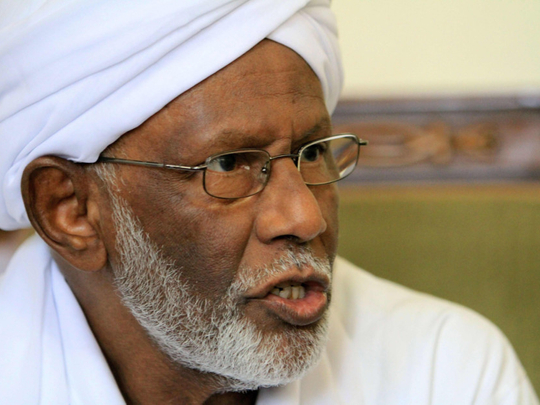
Khartoum: Veteran Sudan Islamist opposition leader Hassan Al Turabi, one of the fiercest critics of President Omar Al Bashir’s government, died of a heart attack on Saturday aged 84, a medical source said.
Al Turabi was taken to the intensive care unit of Khartoum’s Royal Care hospital “after suffering a heart attack in the morning and died” there, the source told AFP.
As news of his death became known, state television interrupted its regular programming and broadcast Islamic verses from the Quran that are recited for the dead.
A key figure in Al Bashir’s regime for a decade after his 1989 coup, Al Turabi later became one of its fiercest critics and led the opposition in urging a Tunisia-style uprising.
He was detained in May 2010, a month after Sudan’s first competitive polls since 1986 for denouncing the election as fraudulent.
Al Turabi was the only Sudanese politician to support a warrant issued for Al Bashir’s arrest by the International Criminal Court (ICC) on charges of war crimes, crimes against humanity and genocide over the regime’s conduct of the conflict in Darfur.
After breaking ranks with Al Bashir he formed his own party, the Popular Congress Party.
Al Turabi was detained several times over a career spanning four decades, including in January 2009 two days after he urged Al Bashir to surrender to the ICC.
An ideologue with influence beyond Sudan’s borders, Al Turabi was one of the driving forces behind the introduction of Islamic Sharia law in Sudan in 1983, which sparked a devastating 22-year civil war with the mainly Christian, African south that cost an estimated two million lives.
The Western-educated Al Turabi held a master’s degree in law from London and a doctorate from Sorbonne University in Paris.
He spoke English, French and German fluently as well as Arabic, and his language skills helped him gain access to foreign news media through which he issued repeated calls for an international Islamic revolution.












